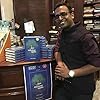Ask the Author: Sanchit Gupta
“Ask me a question.”
Sanchit Gupta
Answered Questions (5)
Sort By:

An error occurred while sorting questions for author Sanchit Gupta.
Sanchit Gupta
It would be Guido and Dora from the 1997 Oscar winning Italian film- Life is Beautiful. Set in the backdrop of Nazi Germany and World War -2, it portrays the journey of this jew husband and german wife who stand by each other, no matter wife. It is the sacrifices they make for each other and how love becomes bigger than everything else is what makes them special, and memorable.
The second would be Henry and Catherine from A Farewell to Arms.
The second would be Henry and Catherine from A Farewell to Arms.
Sanchit Gupta
A tale of magical realism in a fictional town.
Sanchit Gupta
Take a shower. Go for a walk. Come back. Put your ass on the chair and get to work.
Sanchit Gupta
Stay true. Be honest to your view of the world and have the courage to stand for it. Do it because the fire inside you will not let you live unless you do. That is the only good fight that is.
Sanchit Gupta
This goes long back. Nearly a decade before I wrote the first word of The Tree with a Thousand Apples, I was a student who happened to read an article on the then ongoing conflict between Israel and Hamas in Lebanon. I couldn’t understand much of world politics back then, but what I could not forget was that the article was written from the point of view of a ten year old boy. This boy had just lost his home, his town and his family, even though he was not a part of Hamas and he was not an Israeli. He was a Lebanese, the place who was not on either side of the conflict. I found that very peculiar.
Irrespective of how I felt, the boy had lost what he had lost. I too was a boy back then, and how would I have felt if I had lost my family and my home at that age? There won’t be any more birthday parties for him, he won’t play with the neighborhood kids when the evenings dawned, he won’t be scolded for cheating during exams. No, it was not just an attack on his home. What that boy had truly lost was his childhood. Did he know about Hamas? Or Israel? Or terrorism? Or oil prices? Or good and bad? Did he care about any of them? He would have wanted to ask questions, but from whom and when? He must have forged an enemy in his heart, a nameless one. Yet, even though I could read and see all that, I felt I could not really understand it very well. Maybe because as someone who had himself seen a very comfortable childhood, what could I have known about the pain of losing one?
I visited Kashmir about eight years later. And preserved in my memory, that boy from that article came alive in those streets. I saw children who had lost their childhood. I saw children who were not on either side of the conflict, yet had grown to choose one. A side where all of them were right and all of them were wrong. I could see that the Lebanese boy and his nameless enemy were no-one but the same children. Children like us. For eight years I had that boy in my head and my heart. I could see, but I could never understand. The day I did I had to tell this story.
Irrespective of how I felt, the boy had lost what he had lost. I too was a boy back then, and how would I have felt if I had lost my family and my home at that age? There won’t be any more birthday parties for him, he won’t play with the neighborhood kids when the evenings dawned, he won’t be scolded for cheating during exams. No, it was not just an attack on his home. What that boy had truly lost was his childhood. Did he know about Hamas? Or Israel? Or terrorism? Or oil prices? Or good and bad? Did he care about any of them? He would have wanted to ask questions, but from whom and when? He must have forged an enemy in his heart, a nameless one. Yet, even though I could read and see all that, I felt I could not really understand it very well. Maybe because as someone who had himself seen a very comfortable childhood, what could I have known about the pain of losing one?
I visited Kashmir about eight years later. And preserved in my memory, that boy from that article came alive in those streets. I saw children who had lost their childhood. I saw children who were not on either side of the conflict, yet had grown to choose one. A side where all of them were right and all of them were wrong. I could see that the Lebanese boy and his nameless enemy were no-one but the same children. Children like us. For eight years I had that boy in my head and my heart. I could see, but I could never understand. The day I did I had to tell this story.
About Goodreads Q&A
Ask and answer questions about books!
You can pose questions to the Goodreads community with Reader Q&A, or ask your favorite author a question with Ask the Author.
See Featured Authors Answering Questions
Learn more

